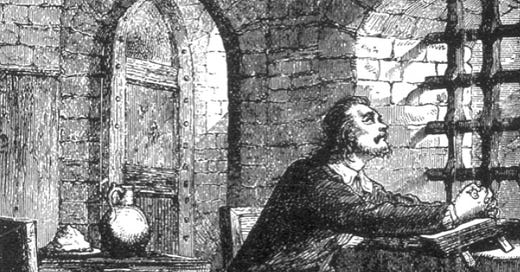Introduction
I like to think that, were I thrown in jail for several years, I would devote much of my new-found free time to prayer. However, past experience suggests I would likely find other excuses for continuing to neglect this duty (“I’ll pray after I count the number of blocks in my cell wall”). Something in me finds prayer at times so unappealing.
This apparently wasn’t a struggle for John Bunyan (1628-1688), as he penned his work, Praying in the Spirit, from a prison cell. In this short little book, he shattered my misconceptions of prayer and opened wide the doors of the throne room of heaven, showing from the Scriptures all the glorious riches Christians may take hold of in communion with God. I want to highlight some features of his approach to prayer that should encourage Christians to “with confidence draw near to the throne of grace,” with just a little bit more, well, confidence.1
First, his definition of prayer in the Spirit. While lengthy, he wastes not a single word:
“Prayer is a sincere, sensible, affectionate pouring out of the heart or soul to God, through Christ, in the strength and assistance of the Holy Spirit, for such things as God has promised, or according to his word, for the good of the church, with submission in faith to the will of God.”2
The rest of the book is essentially an exposition of this definition. Revisiting Bunyan’s words here, I always find a new aspect of prayer that causes me to take heart. I have narrowed the long list of encouraging thoughts from Bunyan’s book to three.
Bunyan’s Helps
(1) Bunyan reminds Christians that communion with God is the main goal of prayer: “True prayer sees nothing substantial, and worth looking after, but God.”3 Here he merely echoes Psalm 73: “Whom have I in heaven but you? And there is nothing on earth I desire besides you. My flesh and heart may fail, but God is the strength of my heart and my portion forever.”4 Prayer for Christians is not primarily a way to “get” things from God but to get God Himself. This doesn’t diminish the value of asking for good things from the Father.5 Rather, it is simply a recognition that Jesus’s promise that the pure in heart“ shall see God,” is worth pursuing.6
(2) Bunyan also warns Christians that prayer, without the Spirit’s aid, is impossible. There is something about the psychology of prayer that makes one feel as though all the effort, for better or worse, is on the one doing the praying. In reality, the Christian cannot utter a single pleasing syllable to the Lord without the help of the Spirit. Writes Bunyan: “Without the Spirit man is so infirm that he cannot…think one right saving thought of God…how shall they be able to address themselves to God, without the Spirit helping this infirmity?”7 Therefore, “there is nothing but the Spirit that can lift up the soul or heart to God in prayer.”8 It is not enough to obey Jesus’s command to avoid imitating the Gentiles, who “heap up empty phrases” in their prayers.9 We must also acknowledge that, even in attempting to pray with sincerity, if we wish to pray prayers pleasing to the Lord, we need the help of the Spirit who “himself intercedes for us with groanings too deep for words.”10
(3) Lastly, Bunyan provides practical wisdom for pursuing godly prayer and avoiding sinful prayer. Perhaps it’s worth dwelling first on the fact that there is sinful prayer. His first example is, “when men regard iniquity in their hearts, at the time of their prayers before God.”11 This would include meditating on whatever prompts ungodly anger, lust, envy, or discontentment in your heart as you pray. How can prayers tainted by sin be pleasing to the Lord? As Bunyan already told us, only the Spirit can transform our hearts and prayers.
Lest his readers be frightful of approaching God in prayer, he exhorts them to “consider the place…God has placed himself to hear petitions and prayers of poor creatures.”12 Hebrews tells God’s people to “with confidence draw near to the throne of grace, that we may receive mercy and find grace to help in time of need.”13 It is not a throne of holy wrath or vengeance, but a throne of patient, merciful love. Christians should never flee from God’s throne on account of their sinfulness; it is precisely God’s throne of grace to which we should run in our sin, “that we may receive mercy.”
Conclusion
I’ve become frustrated with my own spiritual lethargy. “Why don’t I desire to pray?” I ask myself. Yet after reading Bunyan’s description of the gift of prayer, I find myself unable to stay away from the throne room. There, I find not only grace and mercy, but “fullness of joy” and “pleasures forevermore.”14 My exhortation is the same as Bunyan’s: Don’t neglect this glorious duty and privilege.
Heb. 4:16.
John Bunyan, Prayer (Illinois: Versa Press, 2022), 5.
Bunyan, 11.
Psalm 73:25-26 (ESV). Emphasis mine.
Luke 11:10-13.
Matt. 5:8.
Bunyan, 22.
Bunyan, 29.
Matt. 6:7.
Rom. 8:26.
Bunyan, 50.
Bunyan, 56.
Heb. 4:16. Emphasis mine.
Psalm 16: 11.





Thanks Justin. Great reminders!
Convicting and encouraging!